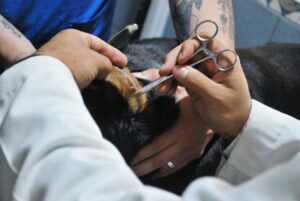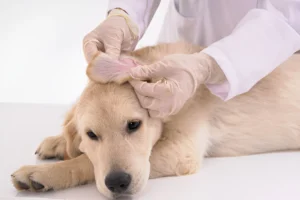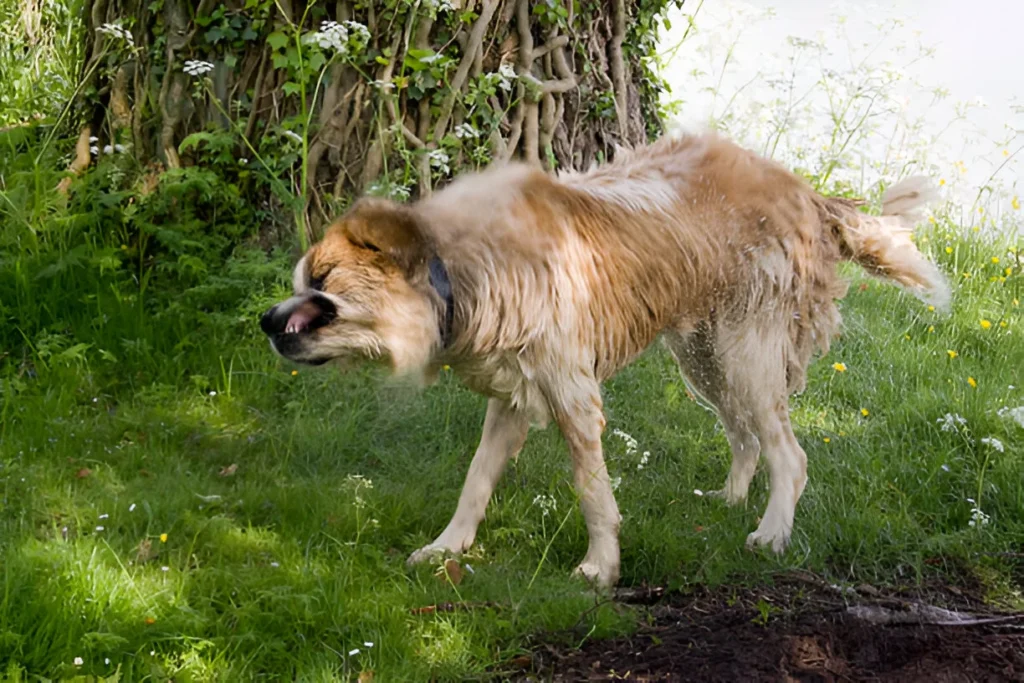If you’ve been asking; why is my dog shaking his head, It’s possible that you’re thinking if you should worry or not. While many dog behaviors are typical, it can be concerning if you notice them occurring more frequently than usual.
Dogs naturally shake their heads after enjoying a long, relaxing snooze, a refreshing swim, or a good stretch to ease any pain they may be experiencing, such as water in their ears or an itch. More concerning is involuntary head shaking, which frequently manifests as jerking, twitching, trembling, or bobbing.
Your dog may be shaking its head for a few reasons
Veterinarians often encounter the problem of dogs shaking their heads. When one or both of their ears hurt or irritate, most dogs will shake their heads. Both the internal ear canals and the external ear flap (pinna) may be impacted by several possible causes.
Whatever the issue, it is critical to diagnose and treat it as, if left untreated, ear diseases alter the ear’s structure irreversibly, increasing the likelihood and severity of subsequent issues.
Four Typical Reasons Why Dogs Shake Their Heads
Ear Parasites
Foreign Bodies
Ear Allergies or Skin Disease
Ear Infections
Ear Parasites

Numerous common parasites might inflame your dog’s ears. The two most frequent ones are fleas (Ctenocephalides canis/felis), which itch the pinnae or ear flaps, and ear mites (Otodectes), which infest the ear canals. Even though flea infections are less likely to result in skin issues elsewhere, dogs with ear mite infestations typically exhibit more extensive scratching, as well as possible scaling and crusting of the skin down the back. Additionally, fleas can be seen against light-colored hair coats or on a flea comb.
During an otoscopic examination of the ears, your veterinarian may diagnose you with an ear mite infestation. Due to their small size, these parasites are typically invisible to the unaided eye. However, when you examine the dog’s ears yourself, you can notice that they have an accumulation of that distinctive flaky, dry wax.
Sarcoptic mange affects companion dogs less frequently. The pinnae may experience the worst of the infestation in the early stages, but the issue swiftly spreads to the rest of the body, resulting in generalized irritation, hair loss, and scabbing.
All of these infestations have the potential to lead to skin diseases in pet owners, but in healthy humans, they typically go away on their own.
Foreign Bodies in the Ear
Your dog will start tossing their head abruptly if they find grass seeds or other foreign objects in their ears. They may appear upset, and this can be frenzied and severe.
When foreign material is removed quickly, the ear usually looks clean and may not appear irritated. An otoscope is a specific tool that a veterinarian can use to peek inside your dog’s ear and check for foreign objects. But to get rid of it, they might have to sedate them.
Ear Allergies or Skin Diseases
In pets, especially dogs, allergic skin illness is a very common cause of ear problems. Pet allergies are becoming an increasingly common issue in veterinary practice, much like in human medicine. This creates challenges for the diagnosis and treatment of these individuals. At best, allergic ear illness is likely to return, and at worst, it might need lifetime therapy. The reason behind your dog’s head shaking could be a more widespread itch or skin irritation.
There is an infinite variety of substances that could cause an allergy, and a pet may frequently be susceptible to multiple allergens. For instance, a lot of dogs who have a flea allergy may also have an allergy to indoor dust mites. Food allergies are the ‘easiest’ to treat out of all the allergy types we have identified because we can control the majority of what our pets eat. Identifying and removing the offending protein (usually proteins like chicken, beef, or gluten) from the pet’s diet is the first step in perhaps managing its symptoms.
If your dog has a skin allergy, the head-shaking will normally have gotten worse over time until you realize something is wrong. However, certain types of bacteria can cause abrupt flare-ups (see below) when they colonize the injured ear canal.
Ear Infections
Dog ear infections are rarely the main issue in why is my dog shaking his head. As previously mentioned, they typically originate from inflammation or injury to the ear canal brought on by parasites, foreign objects, or skin allergies. Anatomical abnormalities, such as scars from prior ear issues, might make it more difficult for the ear to drain and ventilate, as well as increase the risk of infection.
Bacteria like Staphylococcus pseudointermedius or yeasts, most commonly Malessezia species, can cause infection. These two groups are typical occupants of the ear canal in dogs and multiply when the skin’s natural defenses are compromised. Severe infections caused by Pseudomonas species or coliform (fecal) bacteria might manifest with more severe symptoms, a more abrupt start, and resistance to several first-line medications. To make sure the right course of treatment is selected in these situations, laboratory culture and sensitivity testing are crucial steps in the veterinary diagnostic process.
Solutions for Canine Ear Issues
Naturally, the underlying cause of your dog’s ear disease will determine the best course of action. Treating parasite infestations can be accomplished using a variety of easily accessible over-the-counter medications. For the management of many other illnesses covered above, consultation with a veterinarian skilled in dermatology is necessary since improper or ineffective therapies might injure the delicate ear canal.
In my day-to-day work, I frequently come across animals whose owners have given them ear drops for perforated eardrums, leaving them permanently deaf. The safety of applying topical therapies and the presence of an unbroken eardrum can only be determined by performing an otoscopic examination of your dog’s ears.
Otoscopy is the simple act of magnifying the ear canal and things, like ear mites, within it by putting a light source with a tiny ‘nozzle’ into the ear. The process is normally very painless, but your dog might need to be sedated if his ear is extremely sore and inflamed.
What Occurs If a Dog’s Ear Illness Is Not Treated
These are a few issues that could arise from neglecting your dog’s ears.

Aural Hematoma
Ear infections and inflammation can cause a variety of issues if they are not properly treated. There is a chance that an aural hematoma will form soon. This happens when a blood artery beneath the skin of the ear flap bursts due to excessive head shaking or pinna scratching. After that, blood builds up beneath the skin, which causes the pinna to enlarge considerably. Your veterinarian has to drain this collection of blood to ease your pet’s agony and discomfort. Scarring from recurrent hematomas, particularly those that are not drained, can result in the development of a “cauliflower ear.”
Rupture of the Tympanic Membrane
Infected ears frequently experience tympanic membrane (eardrum) rupture. Once the underlying issue has been resolved, the ear membrane will regenerate rapidly; but, until it is restored, the likelihood of a middle ear infection increases, and topical treatment application within the ear becomes dangerous.
Middle Ear Infection
The bony region at the base of the ear, which is often shielded by the ear drum, is affected by middle ear infections. In addition to symptoms involving the ear canals, middle ear illness can also cause balance problems, deafness, and perhaps paralysis of the facial nerve. It can be difficult to treat middle ear infections effectively, and it may take months of antibiotic therapy.
If my dog is constantly shaking his head, what should I do?
If your dog appears sore or in discomfort, or if they start shaking their head unexpectedly, you should consult a veterinarian. Examining the ears for foul odors, redness, and discharge may help you determine what might be wrong. In the end, though, it’s probably going to require veterinarian care.
For a few days, you can try applying a cleaning solution to your dog’s ears if the shaking is slight or infrequent and you want to see if it helps. However, make an appointment at the veterinary office if the symptoms are getting worse.
Why is my dog shaking his head without having an ear infection?
It can be annoying if your dog’s ears appear fine but they’re often scratching and tossing their heads at you. Perhaps you’re wondering, ‘Why is my dog shaking his head but are his ears clean?
There are, however, a few reasons why is my dog shaking his head without releasing fluid. For instance, your mutt may be agitated because of an allergy or foreign objects in the ear. Conversely, it could be a head tremor instead of a head shake, so consult your veterinarian.
Why is my dog shaking his head just at night?
Since ear mites are most active at night, your dog may shake their head a lot during the night if they have any unwelcome visitors.
An ear mite infestation can be addressed with extremely efficient treatments, even though this may be bothersome when you’re attempting to sleep. You can resume your sleep schedule with a brief visit to the veterinarian!
My elderly dog is shaking his head. Why?
Your golden retriever may be shaking their head due to an ear infection, allergies, or any of the other conditions listed above.
It’s important to confirm that they are shaking their head and not trembling, though, as the latter might be more dangerous. Your veterinarian can assist in determining the cause of head tremors, which can be brought on by a variety of neurological diseases.
How should dog ears be cleaned?
At first, cleaning your dog’s ears can require two people! It’s preferable to perform it outside or in an area with cleanable surfaces to avoid having to deal with an uncomfortable ear muck mess afterward!
You can remove wax and discharge from deep within the ear canal by applying a cleaning solution, and then you can either use cotton wool to dab the material away or let the dog shake it out.
Conclusion
It’s common knowledge that a dog with an ear infection is shaking its head, and this is often the case. Dogs’ head shaking can also be brought on by ear mites, allergies, foreign items in the ear, or water in the ear.
Your dog may require some treatment from their veterinarian to assist address any ear-related discomfort. Not only will your dog feel more at ease, but you’ll also be able to stop worrying about their incessant head shaking! why is my dog shaking his head?
